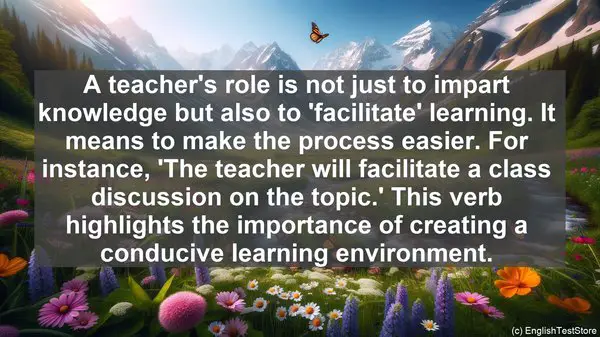Introduction
As a teacher, I understand the importance of effective communication when discussing educational reforms and teaching methodologies. In this lesson, I’ll be sharing the top 10 English verbs that will not only enhance your vocabulary but also help you express your thoughts clearly in the field of education.

1. Implement
The verb ‘implement’ is crucial when discussing educational reforms. It means to put a plan or policy into action. For example, ‘The school plans to implement a new curriculum next year.’ By using this verb, you can convey your understanding of the practical aspect of reforms.
2. Adapt
In the ever-evolving world of education, the ability to ‘adapt’ is essential. It means to adjust or modify teaching methods to suit the needs of students. For instance, ‘The teacher had to adapt her lesson plan for the online class.’ This verb highlights the importance of flexibility in teaching.
3. Assess
When it comes to evaluating student progress, the verb ‘assess’ is frequently used. It means to measure or judge. You can say, ‘The teacher will assess the students’ understanding through a quiz.’ This verb emphasizes the role of continuous evaluation in the learning process.
4. Incorporate
To make lessons more engaging, teachers often ‘incorporate’ various resources or activities. It means to include or integrate. For example, ‘The teacher will incorporate a group discussion in the lesson.’ This verb highlights the importance of varied teaching strategies.
5. Collaborate
In the modern educational landscape, ‘collaboration’ is highly valued. It means to work together. For instance, ‘The teachers collaborated to create a cross-curricular project.’ This verb emphasizes the significance of teamwork in education.
6. Motivate
A good teacher knows how to ‘motivate’ students. It means to inspire or encourage. You can say, ‘The teacher used real-life examples to motivate the students.’ This verb highlights the role of inspiration in the learning process.
7. Demonstrate
When introducing a new concept, it’s important to ‘demonstrate’ it effectively. It means to show or explain. For example, ‘The teacher will demonstrate the experiment before the students try it.’ This verb emphasizes the significance of visual learning.
8. Facilitate
A teacher’s role is not just to impart knowledge but also to ‘facilitate’ learning. It means to make the process easier. For instance, ‘The teacher will facilitate a class discussion on the topic.’ This verb highlights the importance of creating a conducive learning environment.
9. Encourage
To foster a positive learning atmosphere, teachers often ‘encourage’ active participation. It means to promote or support. You can say, ‘The teacher encouraged the students to ask questions.’ This verb emphasizes the role of a supportive teacher-student relationship.

10. Reflect
Lastly, the verb ‘reflect’ is crucial for continuous professional growth. It means to think deeply or ponder. For example, ‘The teacher will reflect on the lesson’s effectiveness.’ This verb highlights the significance of self-assessment in teaching.
